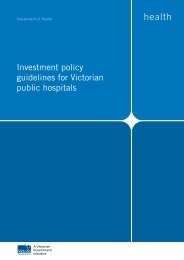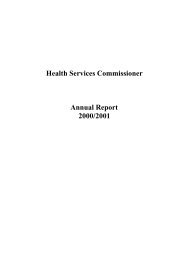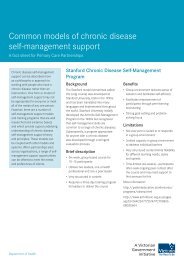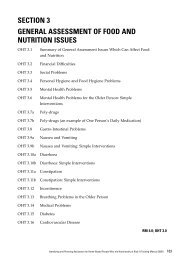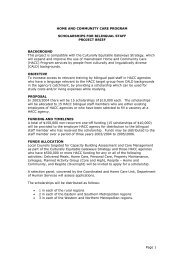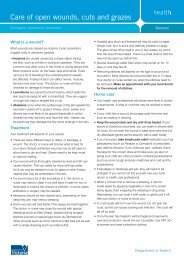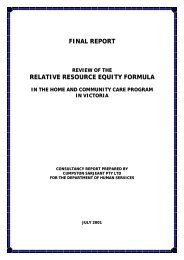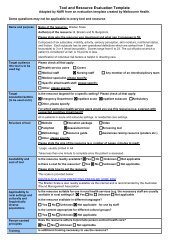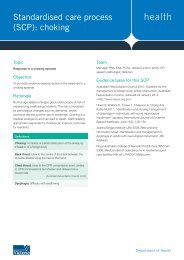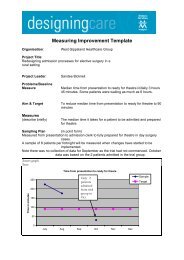Guide to Complaint Handling in Health Care Services
Guide to Complaint Handling in Health Care Services
Guide to Complaint Handling in Health Care Services
Create successful ePaper yourself
Turn your PDF publications into a flip-book with our unique Google optimized e-Paper software.
staff feel they will be listened <strong>to</strong> and given the opportunity<br />
<strong>to</strong> put their po<strong>in</strong>t of view. They also need <strong>to</strong><br />
feel that they have the support of their management<br />
team.<br />
Tra<strong>in</strong><strong>in</strong>g as a result of a compla<strong>in</strong>t<br />
Staff may need tra<strong>in</strong><strong>in</strong>g as a consequence of issues<br />
highlighted by a compla<strong>in</strong>t. The organisation should<br />
commit itself <strong>to</strong> provid<strong>in</strong>g cont<strong>in</strong>u<strong>in</strong>g tra<strong>in</strong><strong>in</strong>g as<br />
needed.<br />
Problems identified by staff<br />
Staff tra<strong>in</strong><strong>in</strong>g and support<br />
An organisation that is committed <strong>to</strong> better compla<strong>in</strong>t<br />
handl<strong>in</strong>g will ensure that its staff are properly<br />
tra<strong>in</strong>ed. The section on ‘<strong>Compla<strong>in</strong>t</strong> handl<strong>in</strong>g skills’<br />
will assist with this, as will the related tra<strong>in</strong><strong>in</strong>g kit.<br />
The compla<strong>in</strong>t system needs <strong>to</strong> be promoted <strong>to</strong><br />
staff. Its effectiveness will be greatly enhanced if there<br />
is a commitment from staff throughout the organisation.<br />
Staff need <strong>to</strong> know that there is a compla<strong>in</strong>t<br />
system, how it works, and why it is important.<br />
Deal<strong>in</strong>g promptly with enquiries<br />
and compla<strong>in</strong>ts<br />
<strong>Compla<strong>in</strong>t</strong>s are an everyday part of staff responsibility.<br />
All staff should be able <strong>to</strong> deal with enquiries from<br />
consumers about how <strong>to</strong> make a compla<strong>in</strong>t. They<br />
may need <strong>to</strong> expla<strong>in</strong> how the compla<strong>in</strong>t procedure<br />
works and answer any questions or anxieties the consumer<br />
may have about mak<strong>in</strong>g a compla<strong>in</strong>t.<br />
All staff should also be tra<strong>in</strong>ed <strong>to</strong> deal with compla<strong>in</strong>ts<br />
themselves. Deal<strong>in</strong>g with compla<strong>in</strong>ts promptly<br />
at the po<strong>in</strong>t where they arise should be seen as a<br />
priority throughout the organisation.<br />
In a complex work environment such as a health<br />
service, there will often be compet<strong>in</strong>g priorities. At<br />
times staff will have <strong>to</strong> decide what needs their attention<br />
first. Nevertheless, managers can give staff practical<br />
support by recognis<strong>in</strong>g that sort<strong>in</strong>g out a compla<strong>in</strong>t<br />
is part of the core bus<strong>in</strong>ess of the organisation.<br />
Support for staff<br />
Importantly, staff need <strong>to</strong> be supported through the<br />
compla<strong>in</strong>t process. It can be quite confront<strong>in</strong>g <strong>to</strong> be<br />
the subject of a compla<strong>in</strong>t and it is important that<br />
In an <strong>in</strong>tegrated system, staff are also able <strong>to</strong> raise<br />
issues or make suggestions. This is often done <strong>in</strong>formally<br />
by talk<strong>in</strong>g <strong>to</strong> the l<strong>in</strong>e manager or by discuss<strong>in</strong>g<br />
matters at staff meet<strong>in</strong>gs. However, it can be useful <strong>to</strong><br />
have a written record of staff concerns, especially if<br />
action is needed from more senior staff.<br />
The same form that is used for consumer compla<strong>in</strong>ts<br />
can also be used for staff <strong>to</strong> report. This is a<br />
systematic way of ensur<strong>in</strong>g that staff concerns become<br />
part of the quality improvement process.<br />
All staff can act on problems experienced by consumers,<br />
whether or not an actual compla<strong>in</strong>t is made.<br />
For example, many patients may be talk<strong>in</strong>g about<br />
park<strong>in</strong>g difficulties. Further <strong>in</strong>vestigation reveals that<br />
construction work has commenced nearby. If this is<br />
registered as a concern by staff <strong>in</strong> the compla<strong>in</strong>t<br />
record<strong>in</strong>g system, senior management can be made<br />
aware of the impact on patients and visi<strong>to</strong>rs. They<br />
can then negotiate with local council <strong>to</strong> relax park<strong>in</strong>g<br />
restrictions dur<strong>in</strong>g the construction period.<br />
Everyone <strong>in</strong> the organisation has a crucial role <strong>to</strong><br />
play <strong>in</strong> improv<strong>in</strong>g health care services. All staff<br />
should be encouraged <strong>to</strong> participate <strong>in</strong> the system by<br />
identify<strong>in</strong>g problems straightaway. Even clean<strong>in</strong>g and<br />
cater<strong>in</strong>g staff have a part <strong>to</strong> play. For example, the<br />
person responsible for deliver<strong>in</strong>g meals may notice<br />
that a patient is eat<strong>in</strong>g very little – the cater<strong>in</strong>g staff<br />
member should alert a member of the nurs<strong>in</strong>g staff as<br />
soon as possible.<br />
Cross-departmental meet<strong>in</strong>gs held at the ward<br />
level on a regular basis will pick up problems identified<br />
by people do<strong>in</strong>g different types of job. Staff<br />
should be encouraged <strong>to</strong> communicate freely with<br />
staff who have other areas of responsibility.<br />
Create an open environment <strong>in</strong> which<br />
patients and staff feel free <strong>to</strong> express<br />
their concerns and where management<br />
structures back that up.<br />
14 Organisational foundations



